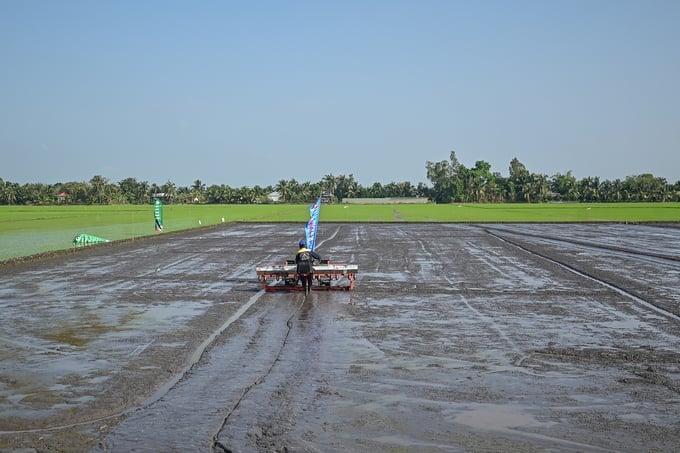June 16, 2025 | 13:20 GMT +7
June 16, 2025 | 13:20 GMT +7
Hotline: 0913.378.918
June 16, 2025 | 13:20 GMT +7
Hotline: 0913.378.918

Minister Le Minh Hoan answered questions on the morning of August 21. Photo: National Assembly.
During the questioning session, Delegate Trinh Minh Binh (Vinh Long) highlighted that, according to Resolution 853 issued on August 30, 2023, by the Standing Committee of the National Assembly, there are strategies in place to address land subsidence in the Mekong Delta region. The delegate requested that Minister Hoan provide an update on the proposed solutions to tackle this issue.
Additionally, Delegate Nguyen Thi Viet Nga (Hai Duong) raised concerns about the resolution from the 6th session of the 15th National Assembly, which mandates the Ministry of Agriculture and Rural Development (MARD) to arrange the relocation of residents from areas at high risk of flash floods, landslides, riverbank, and coastal erosion, or regions severely impacted by natural disasters. The resolution aims to ensure the safety and livelihood of the affected populations.
The delegate asked the Minister to report on the progress made in this regard, including the achievements, challenges, and the roadmap for future efforts.
In response, Minister of Agriculture and Rural Development Le Minh Hoan stated that the Prime Minister had tasked MARD agencies, together with the Ministry of Natural Resources and Environment and other relevant ministries, to develop a project for the Mekong Delta to better adapt to drought, saltwater intrusion, landslides, and land subsidence.
"This project addresses the impacts of climate change on the Mekong Delta and will be finalized and submitted to the Government by next September," the Minister said.
Minister Le Minh Hoan also mentioned that the Ministry has organized multiple workshops with experts, scientists, and local authorities to ensure a coordinated approach that includes both infrastructural and non-infrastructural solutions, as well as interdisciplinary considerations.
Minister Le Minh Hoan emphasized that tackling the challenges faced by the Mekong Delta requires a comprehensive and collaborative effort. "The region is highly vulnerable to the impacts of climate change, including rising sea levels, saltwater intrusion, and extreme weather events. Our approach must integrate both structural solutions, such as infrastructure improvements, and non-structural measures, like policy reforms and community-based initiatives," he said.
The Minister further elaborated on the importance of involving local communities in decision-making. "We are engaging with residents, local authorities, and experts to develop solutions that are not only technically sound but also culturally and socially appropriate. The goal is to create sustainable livelihoods and protect the region's ecological balance," he added.
In addition to addressing climate change adaptation, Minister Le Minh Hoan highlighted the need for a focused strategy on durian production, as previously mentioned. "Durian has the potential to become a symbol of Vietnamese agricultural excellence. By establishing it as a national product, we can enhance its value chain, improve market access, and ensure that farmers receive fair returns for their efforts," he explained.
The Minister called for the development of a dedicated policy framework for durian that supports smallholder farmers and larger agricultural enterprises. "This framework should encompass everything from R&D to production standards, to marketing and export strategies. It’s about creating a cohesive plan that benefits everyone involved in the durian industry," he stated.
In closing, Minister Le Minh Hoan reaffirmed the government's commitment to supporting the agricultural sector in overcoming challenges and seizing opportunities. "Whether it's through climate adaptation projects in the Mekong Delta or the promotion of key products like durian, our mission is to foster resilience, innovation, and sustainability in Vietnamese agriculture," he concluded.

The project of 1 million hectares of high-quality, low-emission rice in the Mekong Delta is a premise for the sustainable development of the rice industry. Photo: Tung Dinh.
Addressing the question posed by Delegate Dieu Huynh Sang (Binh Phuoc) regarding developing brands and trademarks for key agricultural products, Minister Le Minh Hoan highlighted the need for the cashew industry to adapt to market dynamics in the coming years.
Minister Hoan mentioned that the MARD has implemented an agricultural extension model that recognizes the multiple layers of value inherent in the cashew tree. He noted that the Binh Phuoc Young Entrepreneurs Association has been processing cashews in various innovative ways. The Minister encouraged Binh Phuoc province to further promote its OCOP (One Commune One Product) cashew products while stressing the importance of establishing a robust value chain linking cashew growers with processing enterprises.
The Minister reiterated the need to elevate durian to the status of a national product by developing and implementing a comprehensive policy framework that involves farmers, businesses, science and technology, and infrastructure development.
On the topic of durian, Minister Le Minh Hoan indicated that Binh Phuoc province will soon undertake a restructuring of its durian industry. “There is no other way forward. If we want to establish a strong durian brand, we must create an industry association that fosters collaboration among businesses, storage facilities, and durian farmers to safeguard the brand and its trademarks,” he stated.
Minister Hoan also mentioned that the MARD has recently signed a second Memorandum of Understanding (MoU) concerning processed durian products such as durian pulp, durian seeds, and frozen durian. He emphasized that Vietnam has now gained access to the Chinese market for durian exports.
"We must make durian a national product by building and designing a unified policy that supports farmers, businesses, science and technology, and infrastructure. Currently, we are lagging behind Thailand and Malaysia in terms of durian exports to China," Minister Le Minh Hoan emphasized.
Proactively reduce input costs
In response to Delegate Duong Tan Quan's (Ba Ria - Vung Tau) question about input materials, specifically fertilizers, Minister Le Minh Hoan highlighted the need to proactively develop raw material areas to lessen dependency on external sources. He acknowledged this is a long-term challenge, particularly transitioning from inorganic to organic fertilizers.
"This is more than just a matter of importing raw materials for production; if we aim to advance organic agriculture, all input materials must be organic," Minister Hoan explained. He expressed his satisfaction with farmers' increasing adoption of organic farming practices across the country.
“To remain competitive, we must focus on reducing input costs. This requires implementing cost-cutting solutions and changing our mindset. We cannot rely solely on output prices, which are influenced by global supply and demand,” the Minister emphasized. He praised localities actively collaborating with farmers to lower costs and implement effective farming models.
Translated by Quynh Chi

(VAN) The working delegation from the Ministry of Agriculture and Environment conducted an important trip to the Netherlands to strengthen strategic partnerships and sustainable development in the agricultural sector.

(VAN) The letter ‘A Plea from the Ocean’ not only evokes emotion but also awakens the human conscience to the responsibility of protecting life on Earth.

(VAN) The Department of Agriculture in South Africa has announced the country’s first mass vaccination of poultry to prevent local birds from contracting avian influenza.

(VAN) Establishment of the Mekong Delta Regional Agricultural Linkage Center, aiming for a closed value chain, deep processing, trading platforms, and international market connectivity.

(VAN) Gia Lai province has recently recorded 460 rare species of animals and plants, contributing to forest conservation and biodiversity planning in the region.

(VAN) Ms. Caroline Beresford, New Zealand Ambassador to Vietnam, expressed confidence that agricultural cooperation between Vietnam and New Zealand will develop sustainably, be climate-resilient, and promote gender equality.

(VAN) Vietnam reaffirms its commitment to international cooperation in fostering sustainable and responsible fisheries while ensuring resilient livelihoods for small-scale fishing communities.